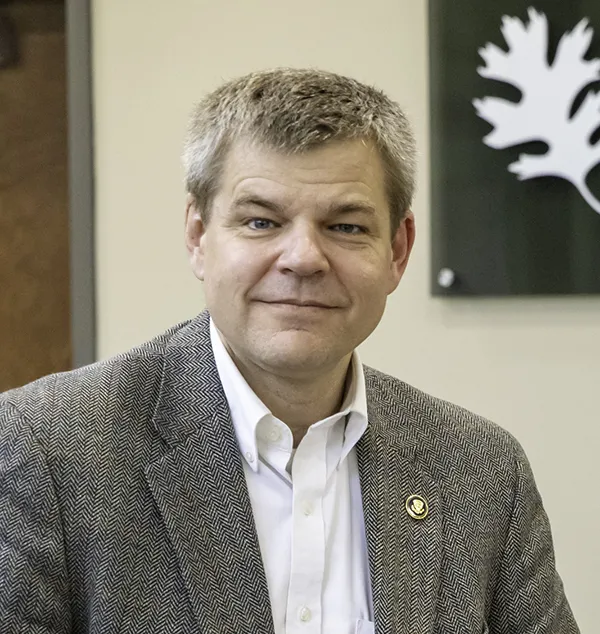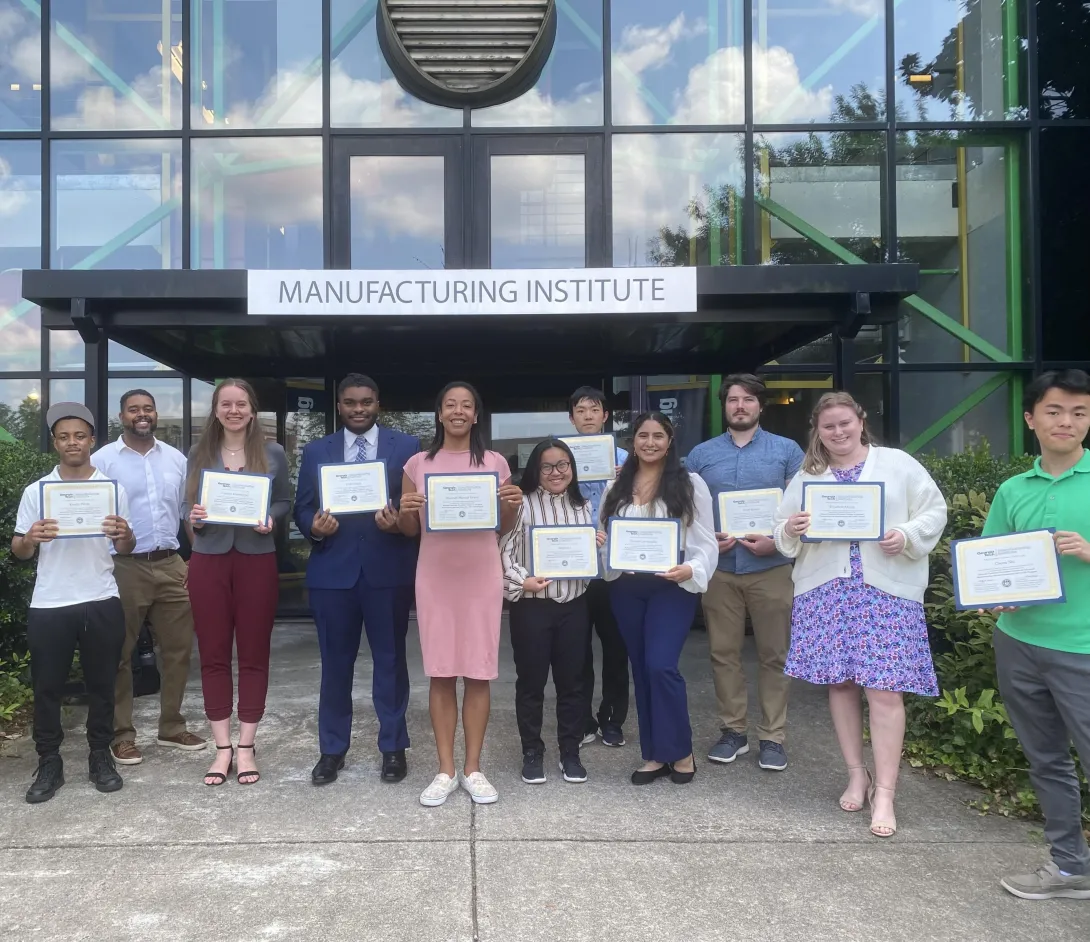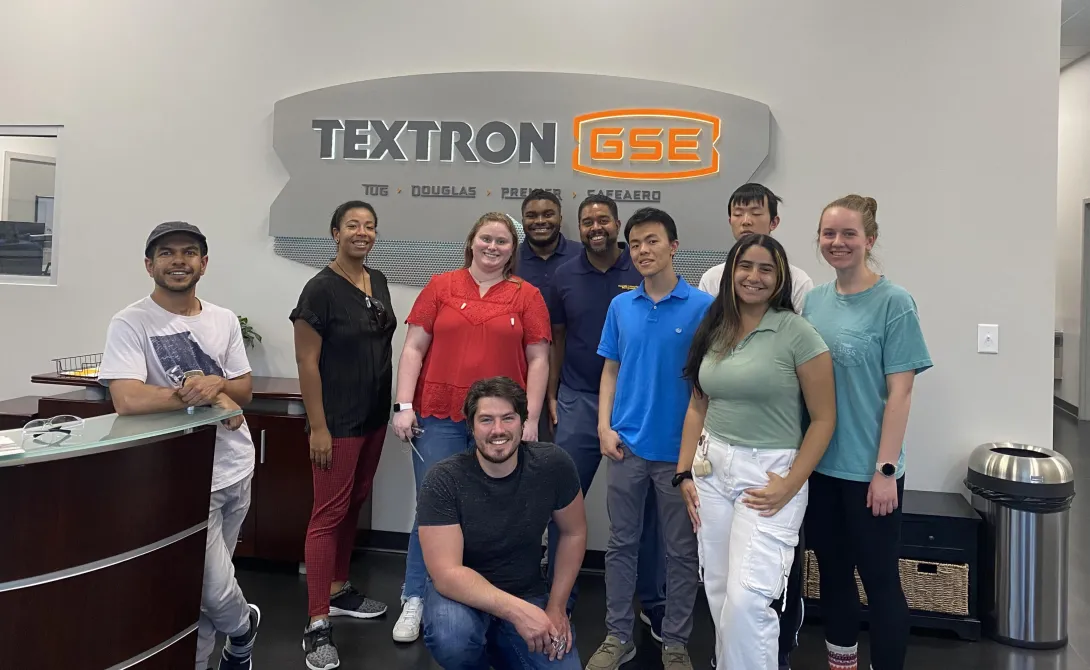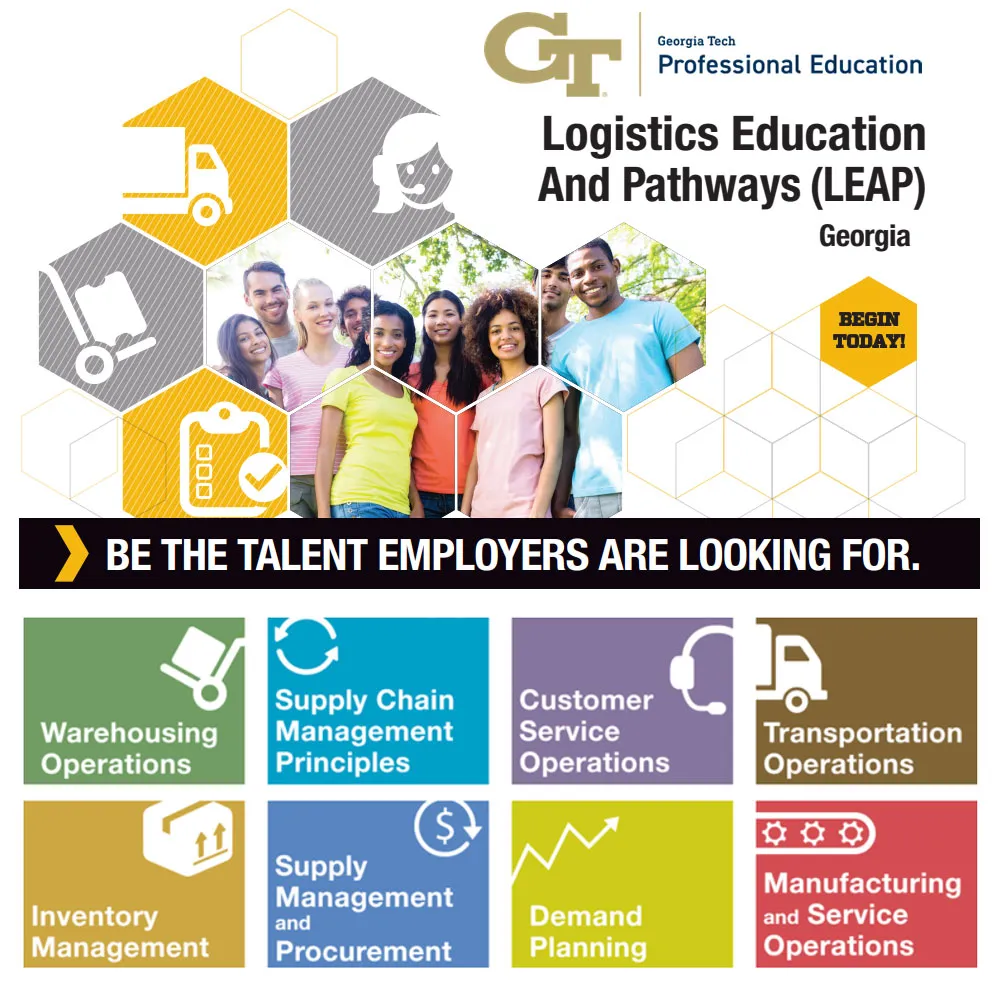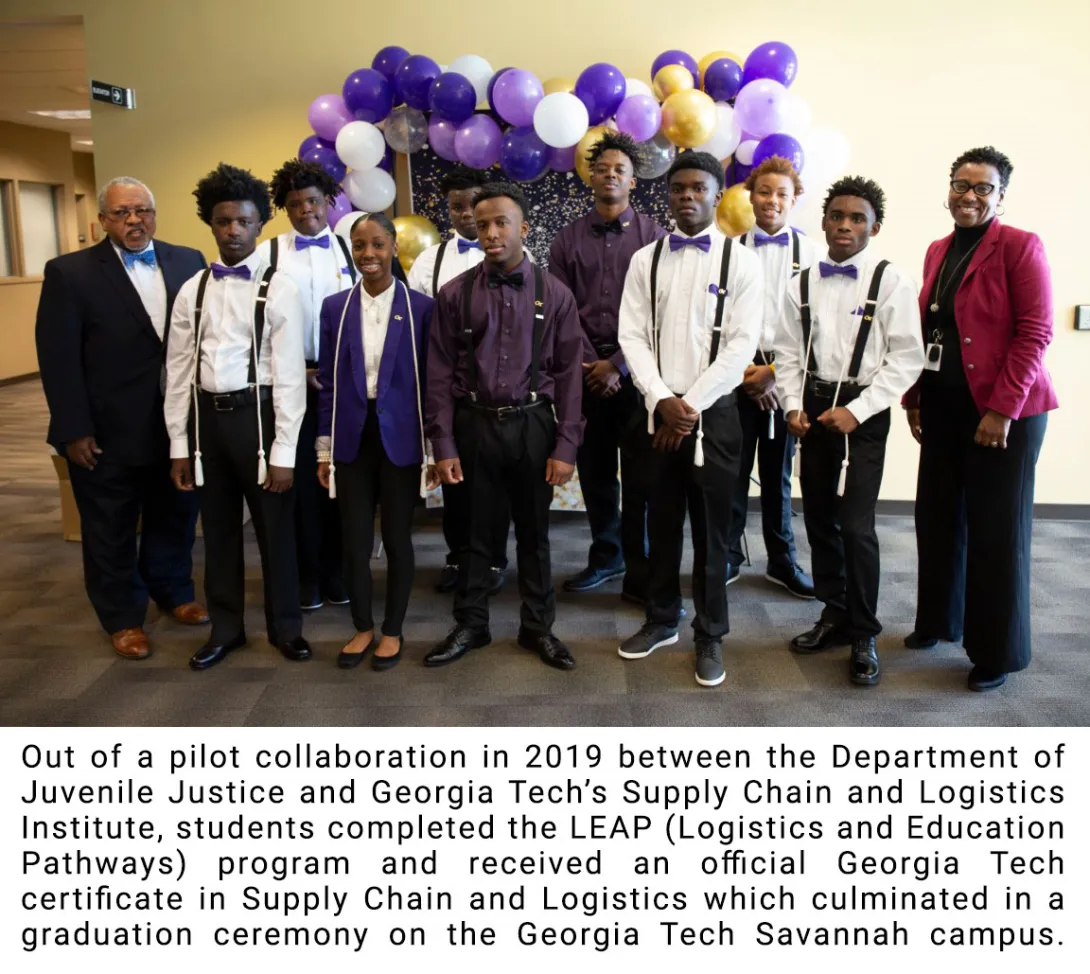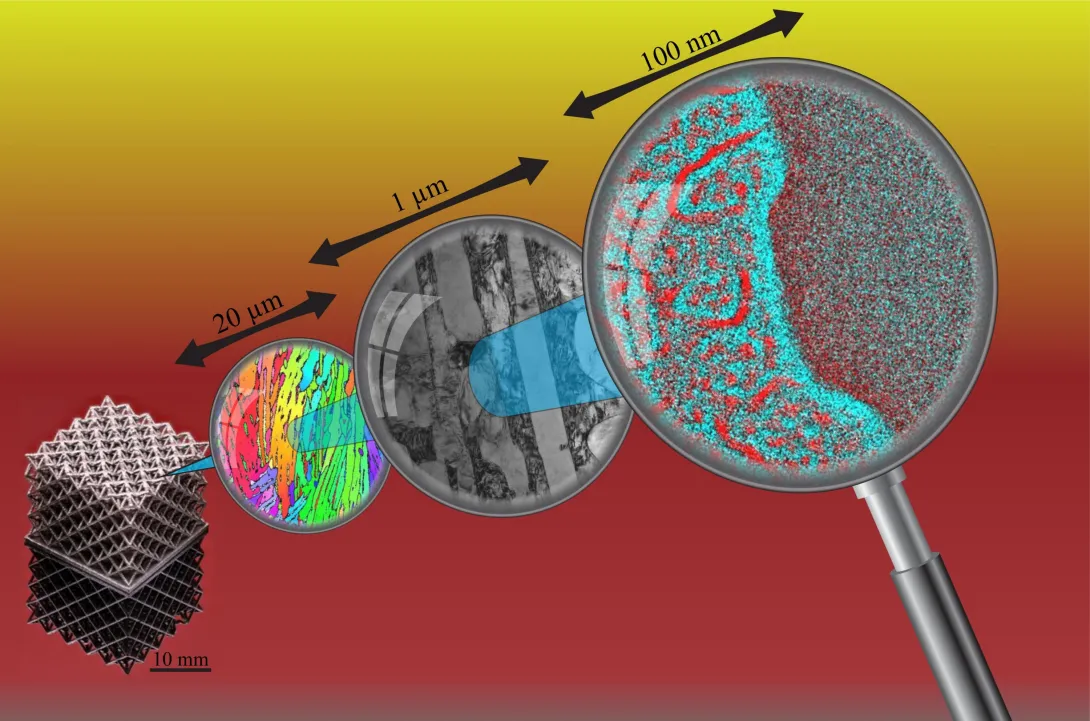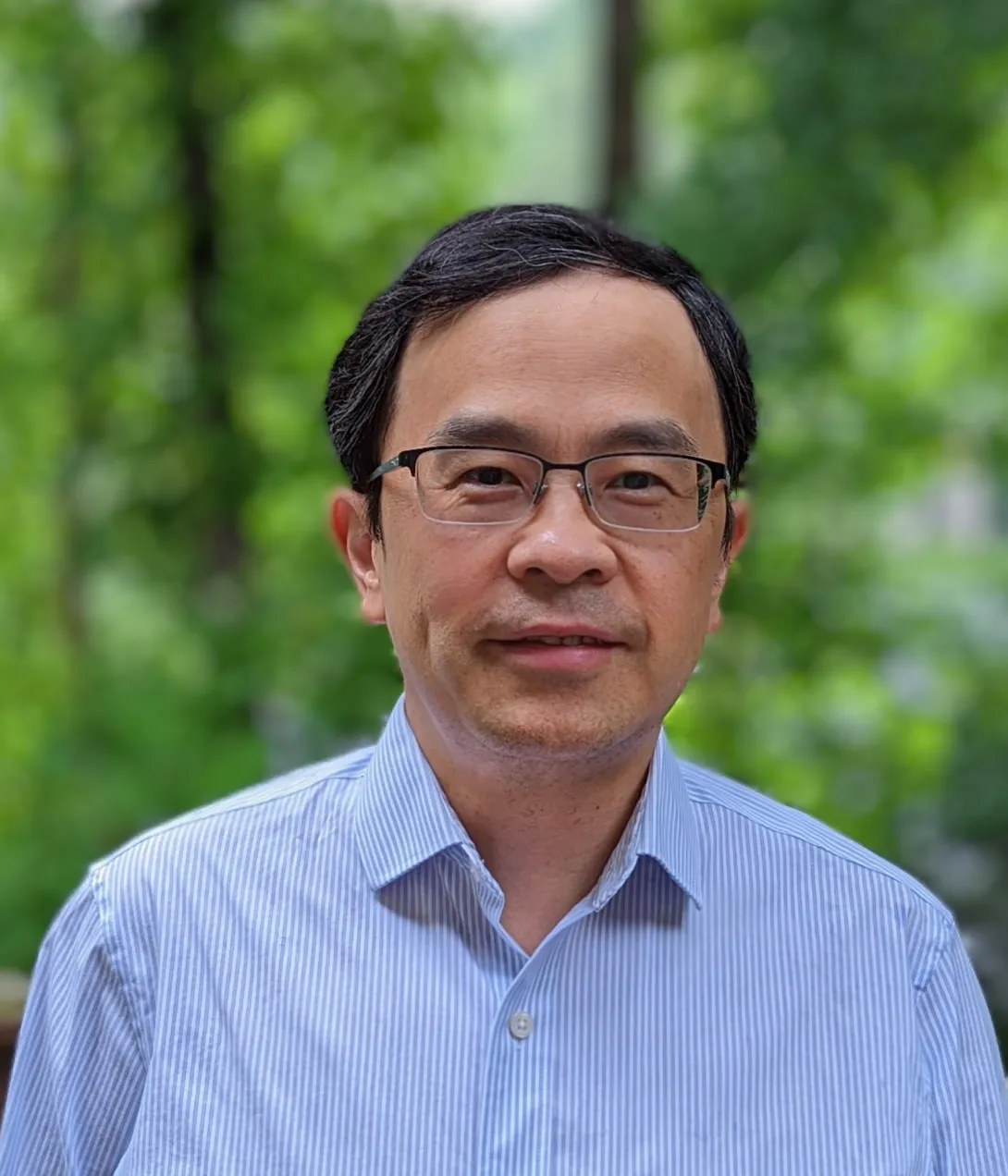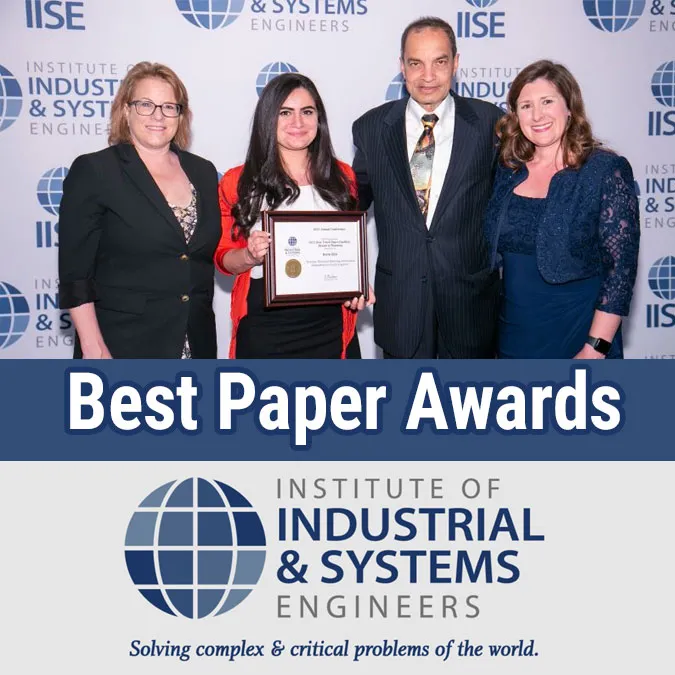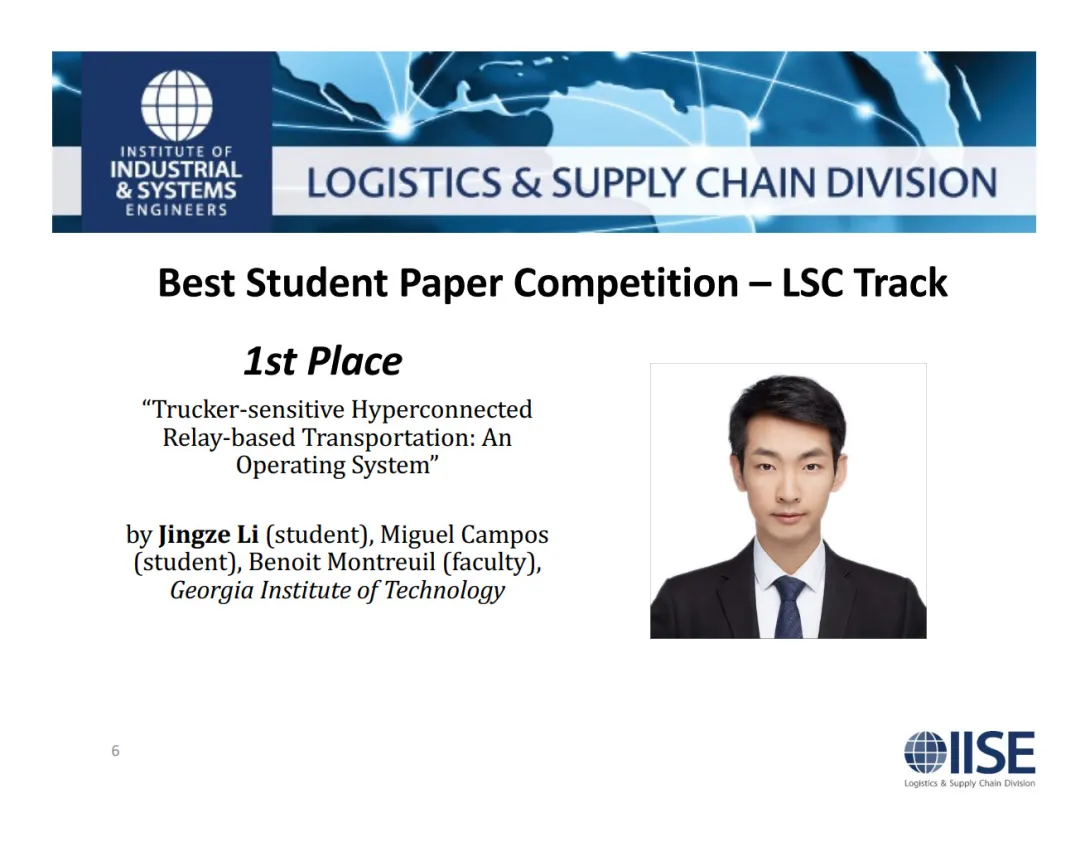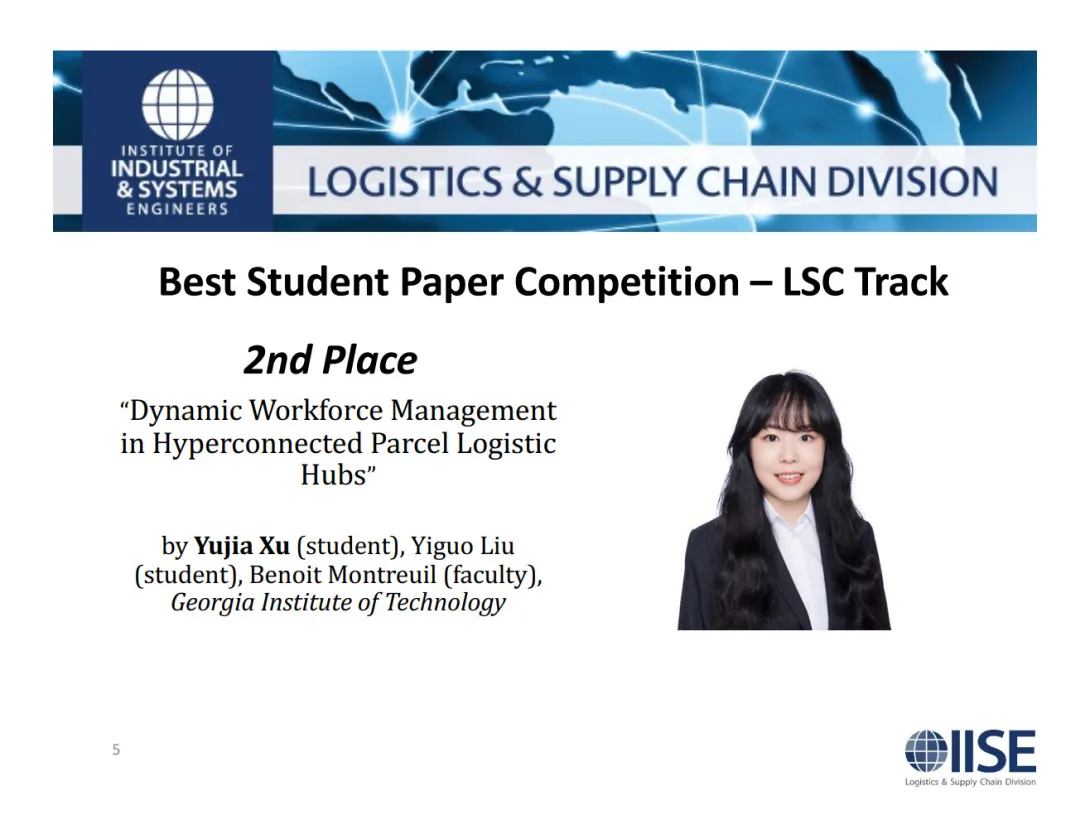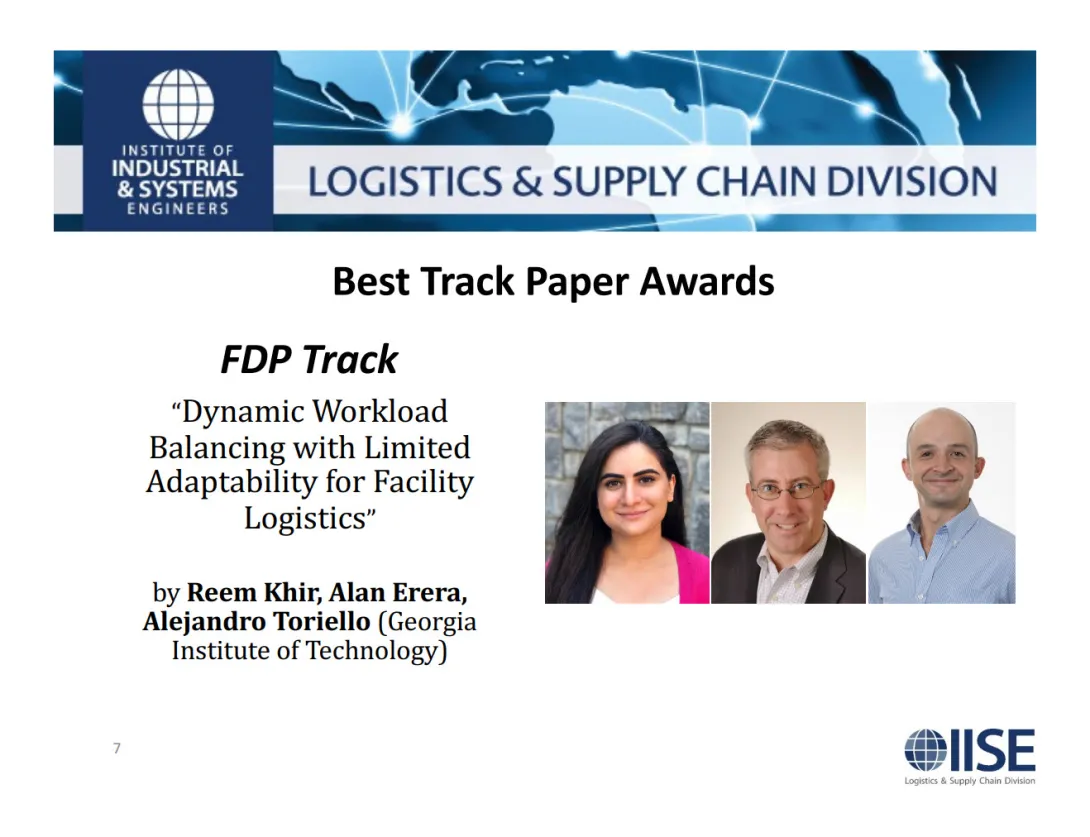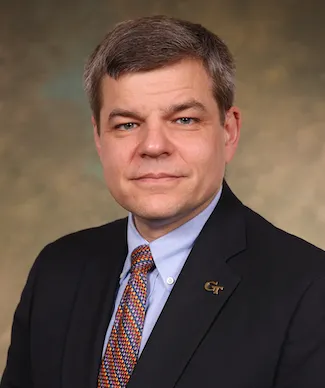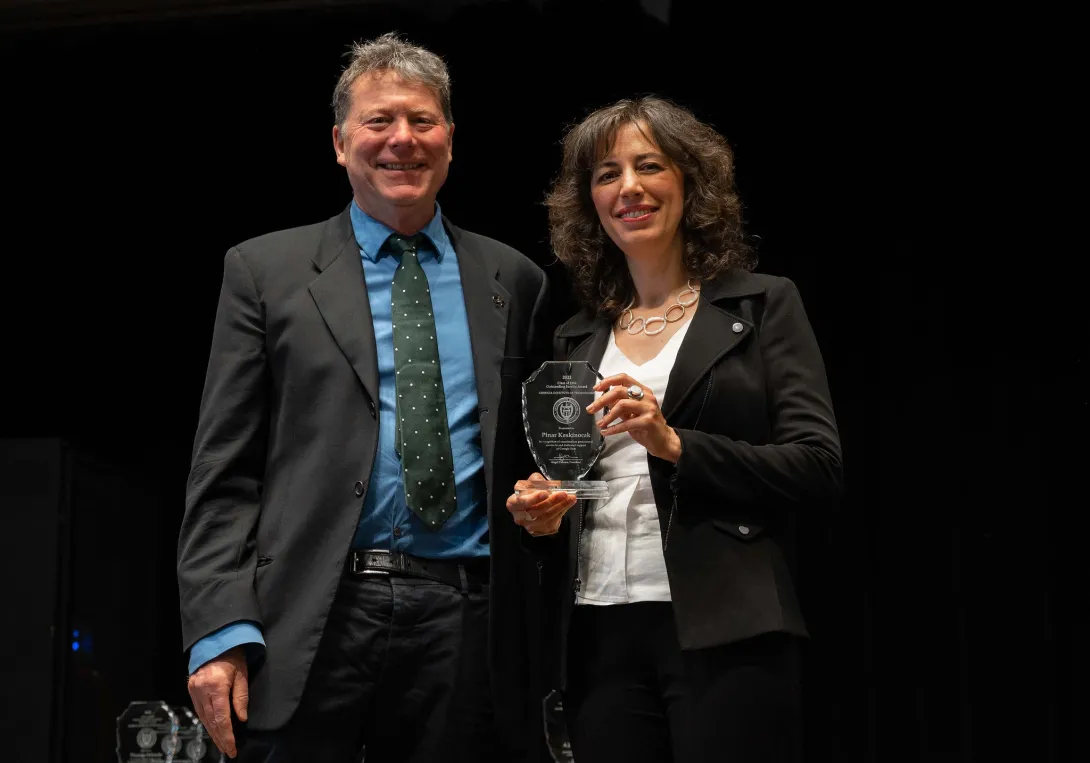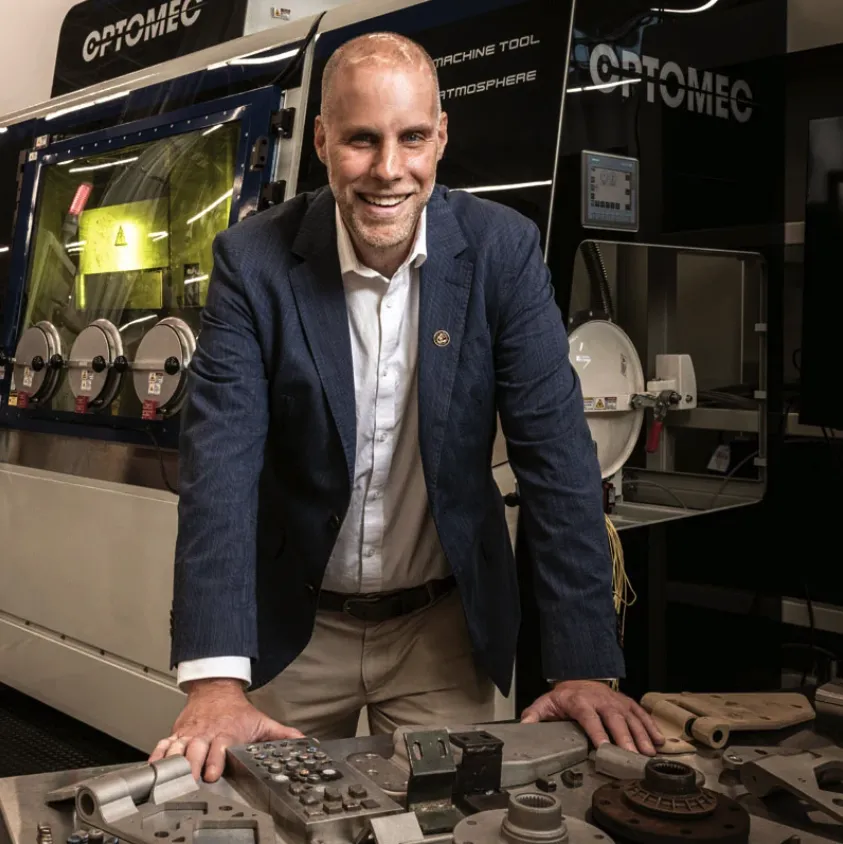Aug. 23, 2022
Thomas Kurfess, executive director of the Georgia Tech Manufacturing Institute and professor in the Woodruff School of Mechanical Engineering, has been selected to chair options for a national plan for smart manufacturing. This National Academies of Sciences, Engineering, and Medicine-appointed ad hoc committee is tasked with developing options for a national plan for smart manufacturing technology development and deployment.
The committee's final report will examine technical frameworks and processes, identify possible timelines and necessary resources, and explore policies and general roles for government, industry, and academia to address near-, medium-, and long-term challenges to improve the productivity and energy efficiency of the manufacturing sector of the United States and ensure U.S. competitiveness. A particular focus will be given to system integration issues, including incorporating manufacturing science, materials science, energy science, and other critical domains.
For information gathering and community engagement, the committee will plan and organize three workshops on the following topics: (1) state of the art smart manufacturing and future directions and needs; (2) potential broader impacts of smart manufacturing; and (3) education, training, and workforce needs for smart manufacturing. Videos and materials from these public workshops will be posted online. The input received during these workshops will serve as input for the final consensus study report.
Committee members include:
CHAIR
Thomas R. Kurfess
Thomas R. Kurfess is the HUSCO/Ramirez Distinguished Chair in Fluid Power and Motion Control and Professor of Mechanical Engineering at Georgia Tech. During 2019-2021 he served as the Chief Manufacturing Officer, and the Founding Director for the Manufacturing Science Division at Oak Ridge National Laboratory. During 2012-2013 served as the Assistant Director for Advanced Manufacturing at the Office of Science and Technology Policy in the Executive Office of the President of the United States of America, where he was responsible for coordinating Federal advanced manufacturing R&D. He was President of SME in 2018, and currently serves on the Board of Governors of the ASME. His research focuses on the design and development of advanced manufacturing systems targeting secure digital manufacturing, additive and subtractive processes, and large-scale production enterprises. He is a member of the National Academy of Engineering and is a Fellow of ASME, AAAS, and SME.
He received his S.B., S.M. and Ph.D. degrees in mechanical engineering from M.I.T. in 1986, 1987 and 1989, respectively. He also received an S.M. degree from M.I.T. in electrical engineering and computer science in 1988.
MEMBER
Richard D. Braatz
Richard D. Braatz is the Edwin R. Gilliland Professor of Chemical Engineering at the Massachusetts Institute of Technology (MIT), where he is affiliated with the MIT Energy Initiative, the Department of Chemical Engineering, the Center for Biomedical Innovation, the Center for Computational Science and Engineering, and Machine Intelligence for Manufacturing & Operations. He was the Millennium Chair and Professor of Chemical and Biomolecular Engineering at the University of Illinois at Urbana-Champaign and a Visiting Scholar at Harvard University before moving to MIT. His primary research expertise is in applied mathematics and control theory and their application to the smart manufacturing of complex chemical and biological products including lithium-ion batteries, advanced polymers, vaccines, and monoclonal antibodies. Honors include the IEEE Control Systems Society Transition to Practice Award, the Technical Innovation Award from the International Society of Automation, the Engineering Research Council’s Curtis W. McGraw Research Award, and the American Automatic Control Council’s Donald P. Eckman Award. He is a Fellow of AIChE, AAAS, IEEE, and IFAC, and a member of the National Academy of Engineering. He received the B.S. from Oregon State University and the M.S. and Ph.D. from the California Institute of Technology – all in chemical engineering.
MEMBER
Jian Cao
JIAN CAO is the Cardiss Collins Professor and the founding Director of NIMSI, the university research center on manufacturing science and innovation at Northwestern University. Cao considers manufacturing as an integration platform and specializes in innovative manufacturing processes and systems, particularly dieless incremental forming process and laser processes. Cao received her Ph.D. in mechanical engineering from M.I.T. Cao is a member of the National Academy of Engineering (NAE) and an elected Fellow of the American Association for the Advancement of Science (AAAS), ASME, CIRP, and SME. Her major research awards include the ASME Milton C. Shaw Manufacturing Research Medal, SME Gold Medal, DoD Vannevar Bush Faculty Fellowship, ASME and Pi Tau Sigma Charles Russ Richards Memorial Award, and SME Frederick W. Taylor Research Medal. Prof. Cao is the Editor-in-Chief of the Journal of Materials Processing Technology. She served as Associate Vice President for Research at Northwestern University, President of the SME North America Manufacturing Research Institute, and a program director at NSF. Dr. Cao is a board member of SME Board of Directors, and of mHUB, Chicago's first innovation center focused on physical product development and smart manufacturing.
MEMBER
Krystel K. Castillo-Villar
Krystel Castillo is an expert in building an intellectual bridge between modeling and optimization of complex smart manufacturing supply chains, integrating energy efficiency and cybersecurity. As Energy VP for DOE’s Cyber Manufacturing Innovation Institute (CyManII, $130M), she leads development of Cybersecure Energy & Emissions Quantification (CEEQ), which captures embodied energy and emissions at the product level throughout the digital supply chain. CEEQ optimizes energy consumption and emissions in advanced manufacturing contributing to saving 1 quadrillion BTUs. These discoveries can revolutionize smart manufacturing and enable secure automated processes and supply chain networks. As professor she has executed 39 grants ($11M). She is the Director of the Texas Sustainable Energy Research Institute (since 2017) managing a ~$4.28M/yr. portfolio and a $50M Alliance with CPS Energy. She was inducted to the UTSA Academy of Distinguished Researchers (2021), received the GreenStar Endowed Professorship in Energy (2015), and selected to participate in the National Academy of Engineering’s 2015 U.S. FOE and 2019 E.U.-U.S. FOE symposiums.She has taught manufacturing courses for more than 12 years and mentored 24 graduate students. She has served as principal investigator in 5 training grants. She is actively recruiting and mentoring next-generation minority leaders and educators in advanced manufacturing.
MEMBER
Lili Cheng
Lili Cheng is a Corporate Vice President at Microsoft, and manages the Emerging Technology Group at Microsoft, is responsible for Conversational AI and the Industrial Metaverse in Microsoft’s Cloud and AI division. She partners with start-ups to large-scale enterprises, to identify areas of collaboration, drive innovation and deliver AI driven products and experiences. Cheng has a long history of research and AI with Microsoft. Cheng founded the Social Computing Group and Future Social Experiences (“FUSE”) Labs in Microsoft Research and works with top universities, and researcher around the world to help develop design and social science curriculum via the Microsoft Design Expo and the Social Computing Symposium. She was the Director of User Experience for Microsoft Windows and has innovated on technical infrastructure in the areas of real time data, search, and AI tools for Microsoft Azure. Prior to Microsoft, Cheng worked in Apple Computer’s Advanced Technology Group on the User Interface research team, where she developed QuickTime Conferencing and QuickTime VR. Lili serves on the advisory board for AI4All, which partners with top universities to amplify diverse AI talent, and is on the board of Connected Camps, a learning organization focused on online learning, governance, and online social interaction. She has been recognized by Time Magazine (“Future of AI”), Forbes (“Women@Forbes 2018”), Fast Company (“Most Creative People 2016”), New York University (“Tisch 50th Anniversary Creativity Award”). She has given numerous keynotes and interviews including Wired, Forbes, O’Reilly Media, SXSW. Cheng was born in Tokyo, grew up in Omaha Nebraska, and lives in the Seattle area with her husband, and has three sons.
MEMBER
James F. Davis
As Vice Provost IT, Jim has broad responsibilities for data and technology solutions in support of UCLA’s digital research and scholarship mission. Within UCLA, Jim co-sponsors the Institute for Digital Research and Education (IDRE). He also has oversight of the Office of the Chief Privacy Officer and the campus Disabilities Computing Program. Nationally, Jim has program oversight and is vice chair of the Governance Board for DOE’s Clean Energy Smart Manufacturing Innovation Institute (CESMII) and was a co-founder of the original Smart Manufacturing Leadership Coalition. He is currently on the Board of Governors of the Manufacturing Leadership Council. In Southern California he is program sponsor of Innovate@UCLA, a partnership with companies engaged in research exchanges and professional development programs in IT leadership. Jim is a Professor in UCLA’s Department of Chemical and Biomolecular Engineering where he does research and consults on AI, machine learning, intelligent systems, monitoring/control, and data/modeling systems across manufacturing industries. Jim was formerly the CIO at UCLA and The Ohio State University and was Board Chair of the Corporation of Education Network Initiatives in California (CENIC). He has past work experience with Amoco Chemicals and is a Fellow of the American Institute of Chemical Engineers.
MEMBER
Robert X. Gao
Robert Gao is the Cady Staley Professor and Department Chair of Mechanical and Aerospace Engineering at Case Western Reserve University in Cleveland, Ohio. He was the Pratt & Whitney Chair Professor in Mechanical Engineering at the University of Connecticut during 2008-2014. His research expertise includes signal transduction mechanisms, multi-resolution signal analysis, and artificial intelligence/machine learning for improving the observability of manufacturing processes and equipment to enhance product quality control. His work has led to the invention of multi-physics sensors and advanced signal processing methods for the in-situ monitoring of manufacturing processes such as plastic injection molding, sheet metal stamping, microrolling, etc. He has published 3 books, over 400 technical papers, including 190 journal articles, and received 13 patents. He is a Fellow of ASME, SME, IEEE, and CIRP, and received several awards from professional societies, including the ASME Blackall Machine Tool and Gage Award, SME Eli Whitney Productivity Award, IEEE Instrumentation and Measurement Society Technical Award, IEEE Best Application in Instrumentation and Measurement Award, etc. In 2020, he was named by SME as one of “The 20 Most Influential Professors in Smart Manufacturing”. Currently he is serving as Chair of the CIRP Collaborative Working Group on AI in Manufacturing.
MEMBER
Satyandra K. Gupta
Satyandra K. Gupta holds Smith International Professorship in the Viterbi School of Engineering at the University of Southern California. He is the founding director of the Center for Advanced Manufacturing at the University of Southern California. His research interests are computer-aided design, physics-informed artificial intelligence, computational foundations for decision making, human-centered manufacturing automation, and robotics. He has published more than four hundred technical articles in journals, conference proceedings, and edited books. He is a fellow of the American Society of Mechanical Engineers (ASME), Institute of Electrical and Electronics Engineers (IEEE), Society of Manufacturing Engineers (SME), and Solid Modeling Association (SMA). He has received numerous honors and awards for his scholarly contributions. Representative examples include a Young Investigator Award from the Office of Naval Research, CAREER Award from the National Science Foundation, Presidential Early Career Award for Scientists and Engineers, Invention of the Year Award from the University of Maryland, Kos Ishii-Toshiba Award from ASME, Excellence in Research Award from ASME Computers and Information in Engineering Division, and Design Automation Award from ASME. He has also received ten best paper awards at international conferences. He earned a Ph.D. in Mechanical Engineering from the University of Maryland. He is a member of National Materials and Manufacturing Board.
MEMBER
Susan N. Houseman
Susan Houseman is Vice-President and Director of Research at the Upjohn Institute for Employment Research. She is a labor economist whose recent research focuses on contract employment arrangements, domestic outsourcing, offshoring, manufacturing, and measurement issues in economic statistics.
She co-directs the Outsourcing Research Network, chairs the Technical Advisory Committee to the U.S. Bureau of Labor Statistics; co-directs the Labor Statistics Program at the Institute of Labor Economics (IZA) in Bonn, Germany; and chaired the National Academies of Sciences, Engineering, and Medicine, Consensus Study on Measuring Alternative Work Arrangements for Research and Policy.. She received her PhD in economics from Harvard University.
MEMBER
Jeannine Kunz
Jeannine Kunz is the Chief Workforce Development Officer for the Society of Manufacturing Engineers. A recognized expert in the field of learning and development for over 20 years, Kunz is at the forefront of workforce management issues, providing forward-thinking learning and development solutions for companies, academia, and individuals. Kunz served on the executive committee of America Makes and is a board member for the National Coalition of Career Development, Chair for National Defense Industrial Association’s Manufacturing Workforce Committee, and sits on CESMII, the Smart Manufacturing Institute, and Advanced Robotics for Manufacturing’s (ARM) Workforce Committees. In 2020, she joined the industry advisory committee for Clemson University’s THINKER graduate program, and in 2022, she was appointed as Board of Director for the Manufacturing Technology Deployment Group. “Crain's Detroit Business” recognized Kunz’s work when the publication selected her as one of its 2018 Notable Women in Manufacturing – in Michigan, as well as one of its 2019 Notable Women in Education. Kunz earned a bachelor’s degree in business and marketing with a concentration in economics from Eastern Michigan University in Ypsilanti, Michigan. She has served on EMU's Alumni Board and the Pittsburgh State University College of Technology Board of Directors.
MEMBER
Chinedum E. Okwudire
Chinedum Okwudire is an associate professor of Mechanical Engineering at the University of Michigan. Prior to joining Michigan, he was the mechatronic systems optimization team leader at DMG Mori USA. He received a PhD degree in Mechanical Engineering from the University of British Columbia in 2009. His research is in smart manufacturing, where he exploits fundamental methods from machine design, control, and computing to boost the performance of manufacturing automation systems at low cost. His research has found applications in 3D printing, machining and nanopositioning. He has received a number of awards and recognitions including the CAREER Award from the National Science Foundation; the Young Investigator Award from the International Symposium on Flexible Automation; the Outstanding Young Manufacturing Engineer Award from the SME (formerly, Society of Manufacturing Engineers); the Ralph Teetor Educational Award from SAE International; and the Russell Severance Springer Visiting Professorship from UC Berkeley. He has co-authored a number of best paper award winning papers on topics related to control, mechatronics and manufacturing. He participated in the 2014 Frontiers of Engineering Education Symposium and has recently served on a NASEM committee for Infusing Advanced Manufacturing in Engineering Education.
MEMBER
Melissa Orme
Melissa Orme, PhD, Vice President, The Boeing Company, oversees Additive Manufacturing activity across the three Boeing business units: Boeing Commercial Airplanes; Boeing Defense, Space and Security; and Boeing Global Services; including metal and polymer flight hardware, as well as research and factory aids to enable product development and increase factory efficiency. Orme is also responsible for guiding the development of the digital thread across the Additive Manufacturing value chain, and the implementation of data driven models from extracted and archived data from the digital thread, utilizing machine learning and artificial intelligence to drive efficiency, quality, and scale within the Additive Manufacturing end-to-end value stream. Other key responsibilities include the development of initiatives geared towards quantifying the positive sustainability trades associated with Additive Manufacturing.
Orme has a diverse professional background and began her career in academia, where she rose to the rank of Full Professor at the University of California, Irvine. In that capacity she developed her internationally renowned research program on net-form manufacturing, where her research resulted in numerous peer reviewed journal articles and 15 U.S. patents. Later, she transitioned to small business, where she served as Chief Technology Officer of Morf3D, a qualified supplier of Additively Manufactured flight hardware to Boeing and other Aerospace and Defense companies. Hence, she has deep experience in technology development through the diverse frameworks of academia, small business, and large corporations. Orme received her PhD, M.S., and B.S. in Aerospace Engineering from the University of Southern California.
MEMBER
Nancy R. Sottos
Nancy Sottos is the Maybelle Leland Swanlund Endowed Chair and Head of the Department of Materials Science and Engineering at the University of Illinois Urbana Champaign. She is leader of the Autonomous Materials Systems (AMS) group at the Beckman Institute for Advanced Science and Technology and holds appointments in the Aerospace Engineering and Mechanical Science and Engineering at Illinois. Her research group develops polymers with biologically inspired autonomous functions such self-healing and regeneration, self-reporting, and self-protection to improve reliability and extend material lifetime. Current research focuses on new energy efficient methods to manufacture polymers and composites with sustainable end-of-life strategies. She is a member of the American Academy of Arts and Sciences, the National Academy of Engineering, and the National Academy of Sciences. She joined the Illinois faculty in 1991 after receiving her B.S. and Ph.D. degrees in Mechanical Engineering from the University of Delaware.
MEMBER
William F. Spriggs
William Spriggs is a professor in, and former Chair of, the Department of Economics at Howard University and serves as Chief Economist to the AFL-CIO. In his role with the AFL-CIO he chairs the Economic Policy Working Group for the Trade Union Advisory Committee to the Organization for Economic Cooperation and Development, and serves on the board of the National Bureau of Economic Research. He is currently, the president-elect of the Labor Employment Research Association, and serves as the Vice Chair of the Board of MDC Inc (Durham, NC). He serves on the Advisory Boards of WorkRise (of the Urban Institute) and the Opportunity and Inclusive Growth Institute of the Federal Reserve Bank of Minneapolis. From 2009 to 2012, Bill was appointed by President Obama, and confirmed by the U.S. Senate, to serve as Assistant Secretary for the Office of Policy at the United States Department of Labor. Some of Bill’s previous work experience includes serving as an Economist for the Democratic staff of the Joint Economic Committee of Congress; and, as staff director for the independent, federal National Commission for Employment Policy. He is a member of the National Academy of Public Administration and the National Academy of Social Insurance; and the 2016 recipient of NASI’s Robert M. Ball Award for Outstanding Achievement in Social Insurance
MEMBER
John W. Sutherland
John W. Sutherland is Professor and Fehsenfeld Family Head of Environmental and Ecological Engineering at Purdue University. Prior to assuming his present position in 2009, he was the Henes Chair Professor of Mechanical Engineering and Director of the Sustainable Futures Institute at Michigan Technological University. He received his B.S., M.S., and Ph.D. degrees from the University of Illinois at Urbana-Champaign. He is one of the world’s leading authorities on the application of sustainability principles to design, manufacturing, and other industrial issues. He has contributed pioneering research and education achievements, and provided leadership to advancing the field of environmentally responsible design and manufacturing. He has served as an investigator on numerous government and industry research projects and has mentored more than one hundred students to the completion of their graduate degrees. He has published over 400 papers in various journals and conference proceedings. Sutherland is a Fellow of SME, ASME, CIRP, and AAAS. His honors and recognitions include the SME Outstanding Young Manufacturing Engineer Award, Presidential Early Career Award for Scientists and Engineers, SAE Ralph R. Teetor Educational Award, SME Education Award, SAE International John Connor Environmental Award, ASME William T. Ennor Manufacturing Technology Award, SME Gold Medal, and AEESP Frederick George Pohland Medal.
MEMBER
Karen A. Thole
Karen A. Thole holds the title of University Distinguished Professor of Mechanical Engineering at the Pennsylvania State University where she directs the Steady Thermal Aero Research Turbine (START) Lab, which focuses on advancing gas turbines for power generation and for sustainable aviation propulsion. Her research is aimed at increasing turbine efficiencies through improving turbine cooling technologies. She uses additive manufacturing to more rapidly advance cooling technologies as well as integrate instrumentation to make measurements not previously possible. Dr. Thole formerly served as the Department Head of Mechanical Engineering at Penn State in which she led the initiation of an online Masters degree in Additive Manufacturing and Design. She is a Fellow of ASME and AIAA. ASME has recognized her impacts with the Heat Transfer Memorial Award and George Westinghouse Gold Medal. In addition, AIAA has recognized her with the Air Breathing Propulsion Award and Thermophysics Award. Dr. Thole holds a Bachelor of Science and Master of Science in Mechanical Engineering from the University of Illinois at Urbana-Champaign, and a Doctorate in Mechanical Engineering from the University of Texas at Austin. She has served on NASA’s National Aerospace Committee and has been a member of two National Academy of Engineering studies including one on low carbon aviation and the other on identifying research needs to advance gas turbines.
News Contact
Aug. 16, 2022
Ten students, including a U.S. Navy veteran, graduated from the 2022 Research Experience for Student Veterans in Advanced Manufacturing and Entrepreneurship (REVAMP) summer program. This student and veteran-focused program is funded by the National Science Foundation (NSF) and hosted each summer by the Georgia Tech Manufacturing Institute (GTMI). GTMI serves as a Research Experience for Undergraduates (REU) site for NSF.
The leader of this REVAMP REU education and work force development (EWD) program is Billyde Brown, Ph.D., EWD director at GTMI and senior research faculty member. Throughout the year, Brown’s role is to create strong partnerships among industry, government, and academia in manufacturing research, development, and deployment while acquiring and managing sponsored research programs. Chuck Zhang, the Harold E. Smalley Professor in the H. Milton Stewart School of Industrial and Systems Engineering and a GTMI-affiliated faculty, serves as the principal investigator of the REVAMP REU program.
Students in the 2022 summer cohort explored a variety of manufacturing research projects with faculty and graduate student mentors from Georgia Tech’s College of Engineering including ceramic 3D printing for bioabsorbable orthopedic implants, metal 3D printing of thixotropic alloys, wireless electrochemical biosensors for bioreactor process monitoring, machine learning and neural networks for optimization of 3D printing and maker-space utilization, slot-die process for large-area polymer coatings, nanowire production, wood composites for green and energy efficient buildings, and microfluidic devices for cell media replacement.
According to participant Valeria Carrasquillo, “I had the opportunity to be a student in the REVAMP Program where I worked with many amazing people and learned a lot through the research.” She is an undergraduate at the University of South Florida majoring in biomedical engineering.
Previous students have performed fundamental research projects in advanced manufacturing topic areas such as additive and hybrid manufacturing, composite joining and repair, cell therapy manufacturing, robotic machining, integrated computational materials engineering, Internet of Things (IoT) sensors, data analytics for adaptive manufacturing, and nanoscale 3D printing.
REVAMP’s major program activities include a seminar series covering a broad array of manufacturing-related topics presented by Georgia Tech faculty and graduate students, external manufacturing plant tours, experiential learning classes on the fundamentals of evidence-based entrepreneurship provided by Georgia Tech’s VentureLab and/or Advanced Technology Development Center (ATDC), a panel discussion from successful minority business enterprise clients of the Minority Business Development Agency (MBDA) Center in Atlanta, and three oral presentations delivered by students to demonstrate their research progress.
A new program element started in 2019 that offered a student veteran orientation, panel discussions, luncheon events, and tours of Georgia Tech Research Institute (GTRI) facilities both on the main campus and Marietta locations that were facilitated together with GTRI veteran faculty and the Georgia Tech Veterans Resource Center director. REVAMP is one of the premier REU programs in the nation for advanced manufacturing research and entrepreneurship training for undergraduate student veterans.
“For the past ten weeks, I have been a part of the National Science Foundation (NSF) REVAMP-REU [program] at Georgia Tech. I worked with Dr. Mark Losego, Dr. Nicolas Somers, and Dr. Alejandro Montón Zarazaga on optimizing the ceramic printing process. I also had the opportunity to work with Brandy Nagel on connecting research to entrepreneurship using the NSF I-Corp model. I am incredibly thankful that I was able to be part of such an amazing program,” said Betsy Moore, a student at Washington and Lee University studying integrated engineering with biology.
This year’s REVAMP-REU 10-week summer program was held from May 25 – August 3 at GTMI located on the Georgia Tech campus.
Students worked under the supervision of different faculty mentors to complete a research project centered on cutting-edge manufacturing science and technology. They also received entrepreneurship training by conducting customer discovery interviews to support a hypothetical product related to their research. As a bonus, eligible students received on-campus housing, $500 towards travel, and a $5,000 stipend.
Congratulations to these student graduates (in bold text) of the summer 2022 REVAMP REU program:
Angela Li
Project: “Mechanical Characterization of Silica Microcapsules for Nanowire Production”
Research mentors: Calib Lanier, Michael A. Filler
Shannan Merced Moore
Project: “Strain-induced Refinement of Grain Size in 3D Printed Zinc Alloys”
Research mentors: Sairam Jaishankar, Dongang Yao
Cobe Smart
Project: “Multi-functional Multi-layer Film Coating on Roll-to-Roll Manufacturing System”
Research mentors: Minwoo Jung, Tequila Harris
Elizabeth (Betsy) Moore
Project: “New Innovative Processes for Additive Manufacturing of Ceramics”
Research mentors: Nicolas Somners, Alejandro Montón Zarazaga, Mark Losego
Kweku White
Project: “Machine Learning to Improve Makerspace Safety and Accessibility”
Research mentor: Amit Jariwala
Owen Shi (and Luka M.)
Project: “Gaussian Mixture Model Multiphysics Simulation for Physics-constrained Neural Network in Additive Manufacturing”
Research mentors: Luka Malashkhia, Jungin Kim, and Yan Wang
Ruoyu (Carl) Li
Project: “A Biosensor for Automating Real-time Therapeutic Cell Growth”
Research mentors: Zhaonan (Zeke) liu, Chuck Zhang
Valeria Carrasquillo
Project: “Wireless Electrochemical Sensor Capsule for Real-time Monitoring in Bioreactors
Research mentors: Aekansh Goel, Eric Vogel, and Billyde Brown
Corinne Drabenstott
Project: “Analysis of Mixing in a Microfluidic Device for Cell Buffer Exchange”
Research mentors: Steven Swingle, Avi Gupta, Todd Sulchek
Tyrel Keener
Project: “Wood-Based Composite for Thermal Management of Buildings”
Research mentors: Yongsong Huang, Akanksha Menon, Kyriaki Kalaitzidou
News Contact
Aug. 05, 2022
The Georgia Tech Supply Chain and Logistics Institute (GT-SCL) residing in and supported by the Stewart School of Industrial and Systems Engineering (ISyE), in coordination with Georgia Tech Professional Education (GTPE), is expanding its Logistics Education And Pathways (LEAP) program with the Georgia Department of Juvenile Justice (DJJ) Reentry Program to implement services for eligible participants in Chatham, Bibb, and Muscogee Education Transition Centers (ETC).
The goal of the ETCs is to reduce recidivisms and enable participants with the tools, training, and opportunities to move forward as a productive member of society with sustainable employment and a rewarding career. LEAP is a fast-paced certification program that prepares secondary education students to compete for successful high-growth jobs in the supply chain and logistics field, an outcome that is a natural component to the mission of the ETCs.
“I want to thank Georgia Tech for being a great corporate partner in rehabilitating our justice-involved youth,” said Tyrone Oliver, Commissioner of the Georgia Department of Juvenile Justice. “The LEAP program will help our youth gain valuable skills to aid them towards a brighter future.”
Initially, this partnership began with a pilot program in July of 2019, and culminated when the DJJ’s Chatham ETC hosted their Award Certification Ceremony on the Georgia Tech’s Savannah campus. Expanding this program in 2022 will equip students not only in Chatham County, but now in Bibb and Muscogee Counties with the knowledge, skills, and credentials for careers in the fast-growing Supply Chain and Logistics industry. All the funding for the LEAP program comes from industry partners like the GA Power Foundation, Schneider Foundation and JP Morgan Chase & Co. In addition, DJJ also contributed funding for this successful partnership with the ETCs.
The LEAP program initially covers understanding with the Supply Chain Management Principles course and then the various domains within the supply chain through three other optional courses (i.e., Customer Service, Warehousing Operations, and Transportation Operations). It also explores with students how the supply chain supports organizations’ strategic and financial goals, and current events through subject matter lectures and simulation exercises.
After completing the program, students receive an official GTPE Certificate of Completion for each completed pass/fail LEAP course (Supply Chain Management Principles, Customer Service Operations, Transportation Operations and Warehouse Operations), that are all sanctioned by the Board of Regents of the University System of Georgia. Typically, at their end-of-program, there is an Award ceremony where they receive their professional education certificate from Georgia Tech Professional Education (GTPE).
“While earning GT Professional Education credentials, attending fieldtrips to Gulfstream, GA Ports Authority, Amazon, or Dynacraft and improving their potential to secure employment in the exploding Savannah Supply Chain Industry, may have served as the initial motivation to attempt the program, the impact was immeasurable. Our students grew in areas that enhanced their self-confidence, work ethic, and intrinsic motivation. As a result, our students view themselves as productive citizens with credentials for quality jobs or careers in their future,” said ArtLisa Alston-Cone, Lead Teacher, DJJ Chatham ETC.
Students have a working knowledge of the fundamentals of Supply Chain and Logistics and will be immediately prepared for internships and job opportunities. Two students completed more than one course, indicating their interest and aptitude in this field. One student who was already working in a distribution operation actually completed four courses, earning a Logistics Fundamentals Program Certificate. After the program in December of 2019 with the DJJ’s Chatham ETC, seven of the eleven graduates received job offers, and another two were scheduled for interviews, making the program a great success. The students in the ETC’s have completed all requirements from the juvenile system. They are in transition to becoming productive members of society. At this point, many students are completing their High School Diploma requirements for graduation or getting their GED. They are typically living with family, a guardian or in a transition home.
“We’ve all had times in our lives when someone has discounted us, intentionally or unintentionally. There will always be that student in the corner who you think couldn’t care less, but given the proper attention and care, they can become a star. It’s easy to predetermine what someone is capable of doing; but when these students take this program, the lightbulb goes off, and they become interested and develop a passion and confidence because of this course,” said Charles Easley Jr., GT-SCL Project Director and Instructor.
The program is delivered in a cohort format so that the students always feel supported not only by the instructors but by their classmates as well. Students receive educational content but also learn how to integrate their training in the real world, so they are prepared to perform in the workplace. Students are taken on field trips with the support of community partners to learn how to apply their knowledge and see first-hand how the supply chain operates. In previous years, students were taken to Georgia Tech’s Atlanta campus to explore The Ferst Center for the Arts, The Supply Chain and Logistics Institute, and The H. Milton Stewart School of Industrial and Systems Engineering (ISyE) so they could see what options are open to them for their future working careers. During these visits they were able to participate in student information sessions, see the innovative technology in the ISyE Physical Internet Lab and interact with faculty like Benoit Montreuil, Tim Brown, GT-SCL, and role models like Gen. Ron Johnson, Professor of the Practice, and ISyE Student Ambassadors. Students were also taken to Gulfstream in Savannah and The Georgia Fair where they participated in a hands-on project to map out the supply chain process for food.
About the LEAP Program
GTSCL created LEAP in 2015 through a grant from JPMorgan Chase & Co. to further the financial services firm’s “New Skills at Work” initiative that promotes workforce development to bridge the gap between the talent employers need and the qualifications of the local talent pipeline. The curriculum and content were developed by The H. Milton Stewart School of Industrial and Systems Engineering (ISyE) at Georgia Tech. In August 2018, JPMorgan Chase & Co. continued once again committed to supporting LEAP with an additional grant. The Georgia Tech LEAP program has been delivered throughout Georgia to Schools, Cohorts, and Individual Students in 18 School Districts or Systems, at 46 different schools public and private, in 13 colleges and universities, and across several well-known organizations and employers. This includes schools like Maynard Jackson HS, Grady HS, North Atlanta HS, Effingham College Career and Career Academy, Fulton Schools College and Career Academy, Newton College and Career Academy, Social Circle HS, Griffin Region College & Career Academy, New Manchester HS; non-profit organizations like Goodwill, United Way(Career Rise), Scouts BSA(Crew 2421), The Latin American Association; and businesses like Sysco, and Mohawk Industries. The program has been continuously supported by generous donations from schools, civic organizations including Effingham College and Career Academy, Fulton Schools College and Career Academy, foundations including Home Depot Foundation, Fulton Education Foundation, Schneider Foundation, Georgia Power Foundation, Regions Foundation, and employers including companies like HMTX Industries, Inc.
News Contact
Kerry Jarvis
912-966-7913
kerry.jarvis@pe.gatech.edu
Aug. 03, 2022
A team of researchers at the University of Massachusetts Amherst and the Georgia Institute of Technology has 3D printed a dual-phase, nanostructured high-entropy alloy that exceeds the strength and ductility of other state-of-the-art additively manufactured materials, which could lead to higher-performance components for applications in aerospace, medicine, energy and transportation. The research, led by Wen Chen, assistant professor of mechanical and industrial engineering at UMass, and Ting Zhu, professor of mechanical engineering at Georgia Tech, was published in the August issue of the journal Nature.
Over the past 15 years, high entropy alloys (HEAs) have become increasingly popular as a new paradigm in materials science. Comprised of five or more elements in near-equal proportions, they offer the ability to create a near-infinite number of unique combinations for alloy design. Traditional alloys, such as brass, carbon steel, stainless steel and bronze, contain a primary element combined with one or more trace elements.
Additive manufacturing, also called 3D printing, has recently emerged as a powerful approach of material development. The laser-based 3D printing can produce large temperature gradients and high cooling rates that are not readily accessible by conventional routes. However, “the potential of harnessing the combined benefits of additive manufacturing and HEAs for achieving novel properties remains largely unexplored,” says Zhu.
Chen and his team in the Multiscale Materials and Manufacturing Laboratory combined an HEA with a state-of-the-art 3D printing technique called laser powder bed fusion to develop new materials with unprecedented properties. Because the process causes materials to melt and solidify very rapidly as compared to traditional metallurgy, “you get a very different microstructure that is far-from-equilibrium” on the components created, Chen says. This microstructure looks like a net and is made of alternating layers known as face-centered cubic (FCC) and body-centered cubic (BCC) nanolamellar structures embedded in microscale eutectic colonies with random orientations. The hierarchical nanostructured HEA enables co-operative deformation of the two phases.
“This unusual microstructure’s atomic rearrangement gives rise to ultrahigh strength as well as enhanced ductility, which is uncommon, because usually strong materials tend to be brittle,” Chen says. Compared to conventional metal casting, “we got almost triple the strength and not only didn’t lose ductility, but actually increased it simultaneously,” he says. “For many applications, a combination of strength and ductility is key. Our findings are original and exciting for materials science and engineering alike.”
“The ability to produce strong and ductile HEAs means that these 3D printed materials are more robust in resisting applied deformation, which is important for lightweight structural design for enhanced mechanical efficiency and energy saving,” says Jie Ren, Chen’s Ph.D. student and first author of the paper.
Zhu’s group at Georgia Tech led the computational modeling for the research. He developed dual-phase crystal plasticity computational models to understand the mechanistic roles played by both the FCC and BCC nanolamellae and how they work together to give the material added strength and ductility.
“Our simulation results show the surprisingly high strength yet high hardening responses in the BCC nanolamellae, which are pivotal for achieving the outstanding strength-ductility synergy of our alloy. This mechanistic understanding provides an important basis for guiding the future development of 3D printed HEAs with exceptional mechanical properties,” Zhu says.
In addition, 3D printing offers a powerful tool to make geometrically complex and customized parts. In the future, harnessing 3D printing technology and the vast alloy design space of HEAs opens ample opportunities for the direct production of end-use components for biomedical and aerospace applications.
Additional research partners on the paper include Texas A&M University, the University of California Los Angeles, Rice University, and Oak Ridge and Lawrence Livermore national laboratories.
Story by Melinda Rose, Associate News Editor at UMass Amherst.
News Contact
Catherine Barzler, Georgia Tech
Jul. 18, 2022
The American Society of Mechanical Engineers (ASME) has honored Georgia Tech aerospace engineering professor George Kardomateas with the Spirit of St. Louis Medal for exemplary work in the progress of aeronautics and astronautics. He is in great company as Daniel Guggenheim, Neil A. Armstrong, John E. Northrup, John W. Young (AE 1952), George W. Lewis, Charles S. Draper, Robert G. Lowey, Michael Collins, and the late Dewey Hodges have also received this premier medal. ASME will present Kardomateas with the medal at the International Mechanical Engineering Congress & Exposition in Columbus, Ohio, October 30-November 3, 2022.
Kardomateas has spent over thirty years improving aircrafts from a structural standpoint. More specifically he investigates ways to ensure that aerospace structures retain their structural integrity. He focuses on the special part of mechanics called fracture mechanics, which studies the conditions for the initiation and propagation of cracks and debonds. “Fracture mechanics and damage tolerance have been very successful in that, nowadays, airplanes don’t usually come down because of structural failure,” explained Kardomateas.
He credits his lifelong scientific triumphs to his education in the United States and Greece, his collaboration with past and present colleagues at Georgia Tech, and the academic system in America. “The environment at Georgia Tech fosters collaboration and innovation. The higher education system provides opportunities through the collegial network in scientific forums where ideas can be exchanged with those inside and outside of your institution.” Former AE School professors, including the late Bob Carlson, and George Simitses, inspired him as colleagues and also acted as mentors to him.
Kardomateas earned a diploma from the National Technical University of Athens in Greece and both his master’s and doctoral degrees from the Massachusetts Institute of Technology. In 1989, he joined the School of Aerospace Engineering's faculty at the Georgia Tech. He has authored three books, An Introduction to Fatigue in Metals and Composites, Structural and Failure Mechanics of Sandwich Composites, and Mechanics of Failure Mechanisms in Structures. He is also the editor of six volumes on the topic of failure mechanics of composite and sandwich structures, an associate editor of the Handbook of Damage Mechanics: Nano to Macro Scale for Materials and Structures, as well as the author of about 200 papers published in refereed journals or as parts of books.
In addition to his work at Georgia Tech, he has served the discipline in several capacities. The ASME Fellow has operated as an Associate Editor of the Journal of Applied Mechanics, and the AIAA Journal, as a Contributing Editor of the International Journal of Non-Linear Mechanics and as a guest editor of the International Journal of Solids and Structures and the Journal of Mechanics of Materials and Structures. In addition, he has served as the technical chair of the 2014 ASME Congress, general chair of the 2015 ASME Congress, and the steering committee chair of the 2017 ASME Congress. He was the elected chairman of the Applied Mechanics Division Composites Committee and the program representative of the Aerospace Division Structures and Materials Committee. Kardomateas has also served in many other panels and committees including as the Chair of the Daniel Guggenheim Medal Award Board, and on the Organizing Committee of the sixth, seventh, tenth and eleventh Institute for Advanced Composites Manufacturing’s International Conferences on Sandwich Structures; he has also served on external evaluation committees for many academic programs.
Currently, the medal winner is working on his next book that focuses on the fracture and fatigue of metallic and composite aerospace structures, which will include his latest research advances in the field.
News Contact
Monique Waddell
Jun. 25, 2022
Physical Internet Center doctoral researchers Jingze Li and Yulia Xu were recognized at the 2022 Institute of Industrial and Systems Engineers (IISE) Annual Conference and Expo for placing 1st and 2nd in the Logistics and Supply Chain (LSC) Division Best Student Paper competition. "Both papers resulted from great team project work with industry leaders, addressing key logistic and transportation challenges and helping to shape the Physical Internet. They are quite timely as they provide solutions helping to alleviate the worldwide trucker and logistic worker shortages" remarked Professor Benoit Montreuil.
Jingze is first author of the paper "Trucker-sensitive Hyperconnected Relay-based Transportation: An Operating System", coauthored by doctoral student Miguel Campos and Professor Benoit Montreuil. Li commented, "In line with the concept of Physical Internet, we want to provide efficient and sustainable solutions from a new transportation paradigm to alleviate worldwide truck driver shortage and detention issues. I would like to give credit to my team, including PhD colleagues Katja Meuche, Yujia Xu, Onkar Kulkarni, faculty members Mathieu Dahan, Leon McGinnis, Yao Xie as well as our automotive manufacturer collaborators Brandon Walker, Ryan Purman, and Mark Owen."
Yujia is first author of the paper "Dynamic Workforce Management in Hyperconnected Parcel Logistic Hubs", with Montreuil as coauthor. "It's my great honor that our work was selected as the second-place winner and I am grateful to my co-author Yiguo Liu and my advisor Benoit Montreuil for their great support and help."
Also of note, Reem Khir, NSF AI Institute for Advances in Optimization (AI4OPT) postdoctoral fellow, received the 2022 IISE Best Paper Award for her work "Dynamic Workload Balancing with Limited Adaptability for Facility Logistics" with Alan Erera and Alejandro Toriello in the Facilities Design and Planning Track, Supply Chain and Logistics Division.
Jun. 10, 2022
The Georgia Institute of Technology has selected Thomas R. Kurfess as the new executive director of the Georgia Tech Manufacturing Institute (GTMI). Kurfess is the HUSCO/Ramirez Distinguished Chair in Fluid Power and Motion Control and professor of mechanical engineering at Georgia Tech. He received his S.B., S.M., and Ph.D. degrees in mechanical engineering from the Massachusetts Institute of Technology (MIT) and received an S.M. degree from MIT in electrical engineering and computer science.
“Chaouki Abdallah, executive vice president for research, and I are very excited about Tom taking on this role. Advanced manufacturing is a top federal priority as an ‘industry of the future.’ Tom’s experience and international reputation from his history in academia, industry, and the government will be a great complement to our existing vibrant community of students, staff, and faculty committed to manufacturing research and education—positioning Georgia Tech to meet regional, national, and global needs,” said Julia Kubanek, vice president for interdisciplinary research at Georgia Tech.
“We’re grateful for the efforts of the search committee led by Professor Meisha Shofner and to the leadership of Professor Ben Wang as executive director of GTMI for 11 years until he stepped down at the end of May. We also appreciate Professor Shreyes Melkote for serving as interim director this month while we finalized Tom’s appointment.”
Kurfess first joined the faculty at Georgia Tech in 1994, and has taken on a variety of special assignments in addition to his teaching and research.
His research focuses on the design and development of advanced manufacturing systems targeting secure digital manufacturing, additive and subtractive processes, and large-scale production enterprises. He is a member of the National Academy of Engineering and is a fellow of the American Association for the Advancement of Science (AAAS), the American Society of Mechanical Engineers (ASME) and the Society of Manufacturing Engineers (SME). He was president of SME in 2018, and currently serves on the Board of Governors of the American Society of Mechanical Engineers (ASME).
During 2019-2021, Kurfess was on leave serving as the chief manufacturing officer at Oak Ridge National Laboratory (ORNL) where he was responsible for strategic planning for ORNL in advanced manufacturing. He was also the founding director for the Manufacturing Science Division at ORNL.
He served as the assistant director for advanced manufacturing at the Office of Science and Technology Policy in the executive office of the President of the United States of America from 2012-2013, where he was responsible for coordinating federal advanced manufacturing research and development.
“For decades, Georgia Tech has led the Nation’s academic institutions in the advanced manufacturing sector. It is an honor for me to be tapped to continue our efforts in this area. I am excited to take the helm at the Georgia Tech Manufacturing Institute (GTMI) in continuing its role as a technology leader in advanced manufacturing for the State of Georgia, the United States, and the world. We will be a conduit enabling the Georgia Tech community in their efforts to accelerate and develop manufacturing technologies and workforce capabilities, providing a forum in which they can openly collaborate, and facilities that are world-class for their efforts. I look forward to engaging a wide range of traditional and nontraditional teams integrating technical areas with business, economic, and policy areas to provide a manufacturing basis for the U.S. and the world that will ensure a strong, just, secure and equitable future for society,” said Kurfess.
“Given that GTMI is one of Georgia Tech’s Interdisciplinary Research Institutes, I look forward to engaging a wide range of traditional and nontraditional teams integrating technical areas with business, economic, and policy areas to provide a manufacturing basis for the U.S. and the world that will ensure a strong, just, secure and equitable future for society.”
The Georgia Tech Manufacturing Institute (GTMI) is one of Georgia Tech’s 10 interdisciplinary research institutes, and an integral part of the broader Georgia Tech research enterprise. In 2021, GTMI celebrated its 30th anniversary. GTMI's mission is to convene industry leaders, government partners, and top researchers to collaborate on the grand challenges facing the U.S. manufacturing industry today: accelerating technology development and deployment, creating quality jobs, ensuring global competitiveness, and advancing economic and environmental stability.
Jun. 01, 2022
School of Industrial and Systems Engineering Professor Pinar Keskinocak was recognized at Georgia Tech’s annual 2022 Faculty and Staff Honors Luncheon with the Class of 1934 Outstanding Service Award. The award recognizes her long service both to the Institute and to her field.
Keskinocak has long served as a leader with the Institute for Operations Research and the Management Sciences (INFORMS). A fellow with the institute, she has served as president, vice president of membership and professional recognition, and is the co-founder and former president of the INFORMS Section on Public Programs, Service, and Needs, and the president of the INFORMS Health Applications Society.
At Georgia Tech she has also served as the College of Engineering Advance Professor for six years and was a leading voice over the past three years of the Covid-19 pandemic. In addition to working with the Georgia Department of Public Health, she served on the Institute’s Covid task force helping to establish an institutional approach to the pandemic.
“It’s an honor, first of all, to have had the opportunity to serve,” she said. “Our communities at Georgia Tech and beyond are wonderful, so to be recognized among all of these outstanding contributors is a great honor.”
Keskinocak’s research focuses on the application of operations research and management science with society impact, particularly regarding health and humanitarian applications, supply chain management, and logistics. She is the director of ISyE’s Center for Health and Humanitarian Systems. Recent work has focused on infectious disease modeling in response to Covid-19.
Jun. 01, 2022
Georgia is a place where people know how to make things. Consider that the parts holding rockets together as they blast into space are made in Dodge County. Carbice in Atlanta produces thermal tape for satellites. And Saft America in Valdosta makes advanced batteries that power airplanes, satellites and race cars.
Manufacturing of all types is soaring in the state, with over 11,000 companies employing an estimated 393,500 workers in 2021 – about 9% of Georgia’s workforce. Approximately three-quarters are production workers.
Today’s manufacturing is clearly not the old assembly line. Software and robots operated by highly trained technicians are driving America’s – and Georgia’s – maker resurgence. Even traditionally low-tech operations such as poultry plants are incorporating technology and robotics to automate dirty or dangerous jobs that are hard to fill.
Companies employing these advanced manufacturing practices had a total output of nearly $62 billion in 2019, representing approximately 10% of Georgia’s Gross State Product, according to National Association of Manufacturers (NAM) data.
Georgia has a lot going for it as a rising star in advanced manufacturing. Its reputation as the best state to do business is the result of a host of assets for companies looking to relocate and grow, according to John Morehouse, director of the Georgia Center of Innovation for Manufacturing at the Georgia Department of Economic Development (GDEcD). These assets include a pro-business climate, a trained workforce and a strategic location that allows companies to reach 80% of the U.S. market via truck, rail or plane. And the Port of Savannah is a gateway to (and from) the world.
One of the biggest draws is Georgia Quick Start, the nation’s No. 1 workforce training program that has provided customized training for more than 1 million workers. Another is the increasing flow of venture capital to the region.
Manufacturers are “recognizing this is where there’s a lot of value, and value is what they’re seeking,” says John Avery, director of the Advanced Technology Development Center (ATDC) at Georgia Tech.
Process Control
Maintaining a technological edge doesn’t come cheap. Southwire Company, a maker of wire and cable, is in the midst of a $1 billion investment that is “putting a lot of money into our factories, making a difference for our customers and adding capacity,” says CEO Rich Stinson.
While the process of making wire and cable has changed little over the years, the technology has advanced.
“What has changed is the equipment and the control of the process to make wire and cable,” explains Southwire Senior Vice President William Berry. “We’ve developed better control of motors, better products such as servo motors [that rotate machine parts with high efficiency].”
To grow manufacturing, the state is channeling resources into helping companies get started and improve their processes and technology. GDEcD’s innovation center has “teams that work in agricultural technology, energy technology, information technology, logistics, manufacturing, in aerospace,” says Morehouse. “We talk to them about what their challenges are to growth, and then connect them to the right resources in the state, whether that be an expert in academia, or other companies, or government agencies.”
The center can gear up to assist an entrepreneur with a new product idea or a large company with a production-line challenge.
New Industrial Revolution
The state, along with its agencies and educational institutions, has been pushing adoption of Manufacturing 4.0 (or Industry 4.0), which is dramatically changing the ways companies improve, manufacture and distribute products. New technologies like the Internet of Things (IoT), cloud computing and artificial intelligence (AI) are being integrated into operations.
Georgia Institute of Technology has been at the forefront of research and development in this area. Its Advanced Manufacturing Pilot Facility (AMPF) is a 20,000-square-foot, reconfigurable R&D facility in Midtown Atlanta that provides space for industrial, academic and government agencies to develop innovative manufacturing projects. It also serves as a teaching laboratory for Tech graduate students.
Made possible by a $3 million donation from the Delta Air Lines Foundation, AMPF is a flexible facility that can house all kinds of advanced manufacturing innovation projects, including industrial robotics and additive, hybrid, composite and digital manufacturing.
Companies use the space to test new designs and get feedback about new ways of producing products, according to Aaron Stebner, associate professor in the George W. Woodruff School of Mechanical Engineering at Georgia Tech, who is working on research integrating data informatics and machine learning for development of new manufacturing processes.
The state is committed to helping Georgia companies acquire and develop such advanced technologies to increase efficiency and competitiveness. As part of this effort, Georgia Tech launched the Georgia Manufacturing 4.0 Consortium to work with businesses in defense and related industries. The Georgia Manufacturing 4.0 initiative “is about helping Georgia manufacturers adopt Industry 4.0 technologies. There’s a special emphasis on small manufacturers who may be overwhelmed about the latest software they should buy, or don’t even have time to think about how to put a sensor on a machine to help with uptime,” says Stebner. “Through those programs, we can actually provide them assistance with workforce training, as well as innovate with them.”
Gulfstream, for example, equips workers with wearable devices to provide remote step-by-step instructions in situations where a supervisor is not on hand, says Stebner. Augmented intelligence can provide that supervision and continuous reminders to the employee.
“The human workforce is going to move to higher value-added activities, as they always have, whether it’s in agriculture, whether it’s in manufacturing today, and mechanization or automation back in the day,” explains Shreyes Melkote, a mechanical engineering professor who is executive director of the Novelis Innovation Hub at Georgia Tech. The partnership between Tech and the aluminum manufacturer and recycler focuses on basic and applied research related to sustainable processes.
Leading-edge Applications
Data is a key to adding efficiency to manufacturing operations. When ProcessMiner opened for business in 2014, its original goal was to optimize manufacturing processes for the pulp and paper industry.
Today, its platform predicts problems in real time using AI within the manufacturing process for companies in the pulp, paper and plastics industries. Pilot projects are underway for water treatment and energy sectors.
“We decided to go ahead and take on the challenge of solving this problem, not for one specific industry, but for manufacturing,” says Kamran Paynabar, co-founder and chief science officer at ProcessMiner.
The company’s focus is “leveraging AI, data science, machine learning, as well as domain knowledge for improving continuous manufacturing systems,” explains Paynabar. It can predict the quality of the product coming off the assembly line by collecting and processing data using machine learning and other technologies.
“Another thing that we really wanted to include in our offering and platform was the combined integration of domain knowledge and process experience plus data analysis to make sure that the solution that we provide actually works for the manufacturing system,” says co-founder and CEO Karim Pourak.
Lumber might seem like a simple business, but Rayonier Advanced Materials is developing decidedly high-tech applications for wood and its byproducts, such as purified cellulose. These substances are used in products that require absorbent materials like baby diapers and adult incontinence products. They’re also used in plastics, run-flat tires, sausage casings, timed-release pharmaceuticals and even LCD screens, according to Larissa Fenn, director of research and development into new high-purity cellulose (HPC) products at Rayonier’s Marketing and Research Center.
One recent project involved the use of wood byproducts to create prebiotics, or the food that fosters the growth of good bacteria in animals. Rayonier partnered with the University of Georgia’s poultry science department to test a product in chicken that was derived from wood extraction processes. “We wanted to see how it would perform in increasing their gut health and helping them to be resistant to disease,” Fenn says.
From Lab to Factory
The state is also a good place for new companies to get up and running.
Carbice is an Atlanta-based start-up company dedicated to designing, developing and producing a unique thermal material to remove heat from electronic devices. It produces thermal tape that can be used in satellites, and the growing company needed assistance to take its manufacturing operations to scale.
Carbice spun out of a lab at Georgia Tech to address a long-standing problem within the space industry of how to control heat generated by satellite circuit boards. It is a prime example of academic research that has evolved into a growing company with a valuable product.
“It’s one thing to be able to do lab-scale demonstrations of technology, but I focused on how do you make the material so that it can be scaled up for manufacturing,” says CEO Baratunde Cola. “Each of these satellites has about 50,000 square inches of thermal glue that they use to put on all the different electronic boxes. And the problem with it is that that glue is a very challenging manufacturing process.”
The company created a first-of-its-kind Space Pad that can adhere to the heat source on a satellite or other device. “Then you can easily take it off and stick it on. It takes a process that used to take three weeks and turns it into a three-minute process,” says Cola.
This is a material that will “replace things like thermal grease and thermal paste or graphite pads and ultimately simplify manufacturing,” says Cola. “It will improve performance across space, power trains in electric vehicles, semiconductor manufacturing, data centers and cloud computing, graphics cards and high-performance gaming.”
Technologies such as 3D printing enable companies to produce products that can be geared to customers in ways that were not possible in the past.
The Atlanta Drone Group is using advanced manufacturing processes to build its unmanned aircraft for “public safety from the ground up,” says CEO Matt Sloane. The company just released a new drone that can be configured to carry different kinds of payloads depending on the need of the individual agency, he says.
“We’ve done a lot of 3D printing of prototype parts, and in some cases, production parts are going to be 3D-printed,” says Sloane. “We’ve done a lot of 3D scanning, looking at the various sensors and scanning them so that we can integrate them into the design. And then we’re using cutting-edge carbon fiber lay-up [lamination] methods, that you typically see in [Formula One] racing rather than traditional drone manufacturing.”
Finding a Better Way
One of the biggest advanced manufacturing sectors is machining. This precision prototyping and manufacturing process creates parts that go into a wide range of products from farm equipment to airplanes.
Eastman’s Kencoa Aerospace, a supplier of multi-axis precision-machined and sheet metal-fabricated components, serves a customer list that includes Lockheed Martin, Gulfstream Aerospace and Boeing, which is constructing NASA’s Space Launch System – the most powerful rocket ever built.
Aerotech Machining is part of a growing manufacturing sector springing up in Chatham County near the Port of Savannah. The firm opened decades ago to serve the aerospace, agricultural, power generation and rail industries. With the aid of CNC (computer numerical control) machine tools, the company designs and produces parts using preprogrammed software and code to control the movement of production equipment. Aerotech can fashion parts using detailed specs as well as create designs to meet a specific use.
“They may come to us with a need, not quite knowing what the part should look like, and we would design and give them a 3D rendering of the part for their approval,” says Aerotech President Joey Jones. “We would make them a prototype. If they accept the prototype, then we will send the part off into production and make them however many pieces they need – from two to 200, or a lot more than that.”
Advanced manufacturing companies like these are driven by the need for efficiency and the elimination of waste from production methods. Many companies have turned to production methods such as lean manufacturing to reduce process inefficiencies. Automation and other technologies are now also decreasing process times and costs.
“We started our lean journey in 2003 and so we’re working to eliminate waste in all areas of the business,” says Brandyn Chapman, CEO of PHX Holdings, which owns Phoenix Stamping Group. The company makes sheet metal and rod component parts. “We’ve utilized technology as another tool to assist to that end. It’s one way we’ve implemented an ERP [enterprise resource planning] system and then utilized that to streamline and automate specific functions through the use of information technology.”
New battery and electric-vehicle parts makers have gotten a lot of press lately in Georgia but one long-time corporate citizen is Saft America. A wholly owned subsidiary of France’s TotalEnergies, the company specializes in advanced technology battery solutions for industry. Its products are in everything from satellites to airplanes where reliability is a must. More than 500 batteries are in space “and we’ve been there since 1966, which I think makes a pretty big statement,” says Kirk Rosenlund, general manager at Saft America.
Across the state, advanced manufacturing is growing as the national economy expands and increasingly companies realize that the best place to make things is right here in Georgia.
This article originally appeared in the June 2022 issue of Georgia Trend.
Written by RANDY SOUTHERLAND
News Contact
Walter Rich
May. 27, 2022
A national shortage has parents and families across the country struggling to feed newborns as store shelves have been left bare of baby formula products – including many brands critical to young children with specific vulnerabilities. Retailers are having to ration their supplies, some parents have resorted to shipping in formula from overseas, and social media sites have been used to crowdsource goods to be shipped to parents nervous about where their children’s next meal might come from.
Georgia Tech economics expert Tibor Besedes says it has been a perfect storm of issues to create this stress-inducing situation.
“Like many other industries, the formula producers have faced supply chain issues with respect to ingredients and containers. Waves of Covid-19 infections have affected their workforce and how much formula they can produce,” explained Besedes.
The final straw that may have led to this nationwide shortage: an Abbott production shutdown in February 2022 after several babies were sickened and two died from bacterial infections connected to consuming baby formula from the Sturgis, Michigan facility. A recall followed, and that facility is believed to make at least 20% of all formula bought by consumers nationwide.
“It is one of a few plants in the U.S. producing formula,” said Besedes. “That fact itself is a bottleneck as those few plants operating in the U.S. produce 98% of all formula sold in the U.S.”
“The formula market has been highly concentrated for a long time,” explained Lindsay Rose Bullinger, Georgia Tech assistant professor of public policy. “Now we’re dealing with a crisis and it’s hard to be proactive.”
The overwhelming majority of those formula products are only made by four different companies, explains Wendy White, a nationally known food safety expert.
“Because infant formula is the sole source of nutrition and targeted at such a vulnerable population, it has extra regulations in the Infant Formula Act of 1980,” explains White.
This includes mandatory registration for any infant formula manufacturers and requirements for all formulation, processing details, and ingredient lists to be filed with the FDA.
The regulations are critical, according to Bullinger.
“We’re trying to make a product comparable to breast milk. Newborn children can’t digest many of the proteins in cow’s milk,” she explained.
Formula is developed by scientists in highly regulated environments for infants that are incredibly susceptible to sickness as their immune and digestive systems have just begun adapting to nourishment outside of the womb.
Diluted or homemade options do not provide the right balance of nutrients that infants need at the most critical time of their lives. Manufactured formulas are made in highly sterile environments to avoid harmful additions from getting into these mixtures.
“It’s incredibly hard to get that right in a home environment without introducing bacteria,” Bullinger said.
Those strict regulations also mean that possible scenarios to help alleviate this formula shortage have been complicated. Just shipping some in from another country? Not so fast.
“Foreign manufacturers need to obtain FDA approvals to begin exporting to the U.S. to make up the shortage,” said Besedes. “The FDA is now looking at manufacturers based in countries with similar regulations to expedite their approvals and increase shipments to the U.S.”
The first relief came from overseas within the past week – a shipment of about 70,000 pounds of formula. More foreign shipments are expected in the coming days, but the supply may only last for about a week as issues continue to compound.
“Once there was a recall and parents heard, they started stockpiling formula,” said White. The result is taking already short supplies and stretching them even thinner.
“The supply chain has to also deal with the unneeded bullwhip effect due to shortage gaming and hoarding behavior, making the situation even worse than what it should be,” says Operations Management Associate Professor Morvarid Rahmani.
White also says that 50% of the infant formula in America is purchased through government subsidies.
States who provide this assistance often sign exclusive contracts with one of these four formula manufacturers. Abbott carries the contract in nearly two-thirds of U.S. states – complicating the purchases for families with infants in those locations.
“Families in communities that are economically disenfranchised may be disproportionately affected,” explained Bullinger. “But even if you have the money, if you cannot buy formula how else are you supposed to feed an infant.”
Families who rely on Supplemental Nutrition Assistance Program (SNAP, also commonly known as food stamps) or Supplemental Nutrition for Women, Infants, and Children (WIC) may not be able to choose which brand of formula they can receive. They can only get the formula their state has a contract with. If it is out, they may just be out of luck.
Some of the most hard-to-find infant formulas are the specialized products developed for newborns with milk allergies or other digestive issues. There’s a special emphasis on sourcing those products for parents in need.
So how much longer could this shortage impact American consumers? At least a few weeks, Georgia Tech’s experts say.
“Abbott is estimating that it’ll take about two weeks to get production to resume but another 6-8 weeks to get formula back on supermarket shelves,” says White.
That means the closed facility should be open in late May with production back up to full speed sometime in August. Limited diversity in the market has left parents in a bind.
“A shortage could be alleviated by increasing output of other plants and manufacturers, which is being done, but it is difficult to replace an entire plant,” explained Besedes.
“Ramping up production has been difficult because of shortages in labor and ingredients as well as production scheduling challenges,” explained Rahmani.
Some desperate parents have had to resort to extreme measures. But pediatricians have said infants should only be fed formula or breast milk. Anything else is likely deficient. Using alternative feeding methods could lead to long-term problems.
“There is a risk that a shortage will mean babies will not be getting the nutrition they need to develop. That could lead to a range of health problems affecting their physical growth and brain development,” explained Senior Research Engineer Maureen Linden from Georgia Tech’s Center for Inclusive Design and Innovation.
“Consumers should listen to their pediatricians and other experts and follow their advice. Pediatricians may have available samples they can give out,” said Besedes.
They can also offer advice for alternative baby formula (to the one in shortage) which is available. Medical experts are strongly advising against diluting formula or trying to recreate it at home which could cause long-lasting damage.
“We may see a rise in the rate of developmental disabilities in the age group that is presently reliant on formula – those presently six months or less,” says Linden.
Nutrition is the most important thing in an infant’s life. It’s the number one priority – making sure we are feeding them and they are developing,” explained Bullinger.
That’s why infants often get so many checkups – to make sure they are growing and gaining weight. Proper nutrition is critical for that to happen.
In the meantime, consumers can take their own action. White says it’s worth trying to buy online or shopping around at different stores.
The federal government has relaxed regulations for SNAP and WIC recipients to be able to get products with increased flexibility.
The White House has also invoked the Defense Production Act which is aimed to help manufacturers ramp up output quickly.
“Those companies will have first dibs at materials and ingredients that are needed to make formula,” said Bullinger.
“This shortage should be temporary, as demand settles, and supply is replenished from the reopened Abbott plant and FDA-approved imports,” says White.
Regardless, Georgia Tech experts have said we should have seen this coming and could have been better prepared and quicker to act – particularly for the sake of the youngest among us.
“The FDA, Biden’s administration, and baby formula manufacturers have been slow in taking actions during the past few months to prevent that. This crisis could have been prevented by timely actions,” said Rahmani.
“Infants always get the short end of the stick. They can’t speak for themselves,” said Bullinger.
Experts in this story:
Tibor Besedes
Wendy White
Lindsay Rose Bullinger
Maureen Linden
Morvarid Rahmani, associate professor, Operations Management Scheller College of Business
News Contact
Steven Norris
Director, Media Relations and Social Media
Georgia Tech Institute Communications
